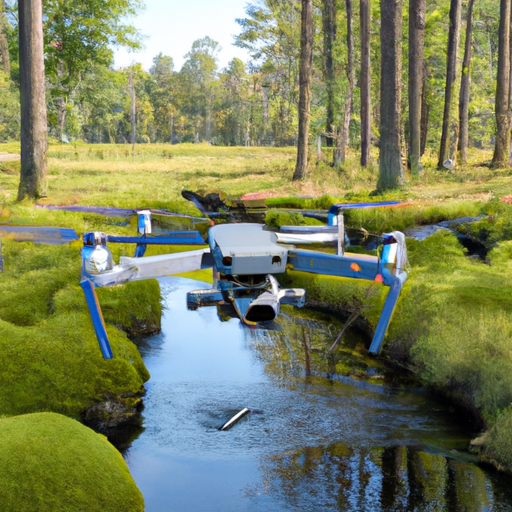If you’ve ever wondered whether your drone could become a source of income, you’re not alone. With the rise in popularity of drones, many people are eager to explore the potential financial opportunities they offer. From aerial photography and videography to surveying and inspections, the possibilities seem endless. So, can you make money with your drone? The short answer is yes, but let’s explore the details and potential avenues for monetizing your drone.
1. The Potential of Drones in Making Money
Drones have become increasingly popular in recent years, not only as recreational devices but also as powerful tools for various industries. The potential to make money with your drone is vast, with numerous opportunities for entrepreneurs and enthusiasts alike. In this comprehensive article, we will explore the different ways you can leverage your drone for financial gain.
1.1 Industrial Applications
Drones are revolutionizing the way industries operate, offering efficient and cost-effective solutions to various tasks. From aerial inspections of infrastructure such as bridges and buildings to monitoring crops and livestock in agriculture, drones have significantly impacted the way businesses perform certain operations.
By investing in the proper training and certifications, you can position yourself as an expert in industrial aerial services. This could involve capturing high-resolution imagery for construction progress reports, conducting thermal imaging for energy audits, or assisting with search and rescue missions. The potential to make money in this sector is substantial, as more industries recognize the value drones bring to their operations.
1.2 Aerial Photography and Videography
One of the most popular applications of drones is in the field of aerial photography and videography. Drones equipped with high-quality cameras can capture stunning aerial shots that were once only accessible to professional photographers with helicopters or planes. This has opened up a whole new market for drone enthusiasts looking to monetize their passion for photography.
Whether it’s capturing breathtaking landscapes, filming events, or providing real estate agencies with impressive property visuals, there is no shortage of opportunities to make money with aerial photography and videography. By honing your skills and creating a portfolio of your work, you can attract clients and establish yourself as a reputable drone photographer or videographer.
1.3 Drone Racing
Drone racing has gained significant popularity in recent years, with thrilling competitions attracting both participants and spectators alike. This exciting sport involves piloting high-speed drones through challenging courses, competing for prizes and recognition.
If you have a passion for drone flying and love the thrill of competition, drone racing can be a lucrative avenue for making money. By joining or organizing local races, you can generate income through entry fees, sponsorships, and even prize money. As this sport continues to grow, there is potential for national and international competitions that offer substantial financial rewards.
1.4 Delivery Services
With the rise of e-commerce and the need for faster deliveries, drones are increasingly being used for last-mile delivery services. Major companies like Amazon and Google have already begun experimenting with drone delivery, and it won’t be long before this becomes more widespread.
While the regulations surrounding drone delivery are still evolving, it presents a significant potential for making money in the future. By investing in the necessary licenses and certifications and partnering with local businesses, you could establish yourself as a key player in the drone delivery market.
2. Legal Considerations and Regulations
Before diving into the world of commercial drone operations, it is vital to understand the legal considerations and regulations that govern their use. Ignoring or neglecting these requirements can result in hefty fines, legal issues, and even the grounding of your drone operations. Let’s explore some essential aspects to consider.
2.1 FAA Regulations in the United States
If you are based in the United States, the Federal Aviation Administration (FAA) is the governing body responsible for drone regulations. These regulations apply to both recreational and commercial drone operations. It is essential to familiarize yourself with the FAA’s guidelines, including registration, airspace restrictions, flight rules, and safety precautions.
One critical regulation is Part 107, which outlines the requirements for commercial drone operators. To operate legally, you must obtain a Remote Pilot Certificate by passing an aeronautical knowledge test. This certification demonstrates your understanding of airspace regulations, safety protocols, and more.
2.2 Drone Licensing and Certification
Beyond obtaining the Remote Pilot Certificate, additional licensing or certifications may be required depending on the type of commercial drone operations you plan to undertake. For example, if you intend to conduct aerial photography for real estate, you may need a photography license or permit.
It is crucial to research and comply with all applicable licensing and certification requirements to ensure your operations remain legal and to maintain a professional reputation.
2.3 Insurance Requirements
Insurance is another crucial aspect to consider when operating a drone commercially. Accidents can happen, even to the most experienced pilots, and having insurance coverage can protect you financially from potential liabilities.
Liability insurance specifically tailored for drone operations is available in the market. This insurance will offer protection against property damage, bodily injury claims, and other related liabilities. Additionally, it may be necessary to consider equipment insurance to guard against damage or loss of your drone itself.
Understanding and complying with legal considerations and insurance requirements will help you navigate the commercial drone industry safely and responsibly.

3. Business Opportunities for Drone Owners
Now that we have explored the potential applications of drones and the legal landscape, let’s dive into the various business opportunities available to drone owners.
3.1 Starting a Drone Services Business
Starting your own drone services business can be a lucrative venture, providing a wide range of services to different industries. As we discussed earlier, industrial applications such as infrastructure inspections, agriculture monitoring, and search and rescue operations are just a few examples of the services you can offer.
To start a successful drone services business, market research and business planning are crucial. Identify your target market, assess the competition, and develop a business strategy that sets you apart. Investing in top-notch equipment, securing necessary licenses and certifications, and building a strong portfolio will help attract clients and establish yourself as a reliable and skilled drone service provider.
3.2 Becoming a Freelance Drone Operator
For individuals who prefer more flexibility or want to explore different industries, becoming a freelance drone operator can be an appealing option. As a freelancer, you can offer your services to clients on a project-by-project basis, allowing you to choose the type of work that interests you most.
To succeed as a freelance drone operator, it is important to build a network of contacts in the industries you wish to serve. Attend industry conferences and events, join professional organizations, and establish connections with potential clients. Additionally, continually improving your skills and staying up to date with the latest drone technology will give you a competitive edge in the market.
3.3 Joining Drone Service Platforms
Another way to capitalize on the growing demand for drone services is by joining drone service platforms. These platforms connect drone operators with clients in need of aerial services, making it easier to find work and establish a customer base.
Platforms such as Upwork, DroneBase, and Airworks offer opportunities to take on various projects, from aerial photography and videography to inspections and surveys. By joining these platforms, you gain access to a wider range of potential clients and can start generating income from your drone.
3.4 Selling Drone Photography and Videography Products
If you have a passion for aerial photography and videography, you can also consider selling your work as products. With the advancements in online marketplaces, you can easily create an e-commerce store to sell prints, digital downloads, or even customized products featuring your stunning aerial imagery.
Investing in high-quality post-processing software and mastering editing techniques will help you create visually captivating photographs and videos that customers will be eager to purchase. Additionally, marketing your products through social media, targeting specific niche markets, and collaborating with influencers can significantly boost your sales.
4. Strategies for Success in the Drone Market
As with any industry, there are strategies you can employ to increase your chances of success in the drone market. Let’s explore some of these strategies:
4.1 Acquiring Advanced Skills and Specializations
To stand out in an increasingly competitive marketplace, it is essential to acquire advanced skills and specializations. This could involve obtaining certifications or training in specialized areas such as aerial mapping, 3D modeling, or cinematography.
By investing in continuous learning and professional development, you position yourself as an expert in niche areas, making you more desirable to clients and setting yourself apart from competitors.
4.2 Building a Professional Portfolio
A strong professional portfolio is crucial for showcasing your skills and attracting potential clients. Invest time in curating a collection of your best work that highlights your capabilities and demonstrates your ability to deliver high-quality results.
Including a variety of projects from different industries and showcasing your versatility will showcase your range of skills and appeal to a broader client base. Additionally, regularly update your portfolio to reflect your most recent and best work.
4.3 Networking and Collaboration
Networking and collaboration play a significant role in the success of any business. Attend industry events, join professional organizations, and actively engage in online communities. By connecting with professionals in related fields, you can foster collaborative relationships, gain referrals, and access new opportunities.
Participating in cooperative projects with other drone operators, photographers, or videographers can also allow you to pool resources, expand your skills, and create more comprehensive offerings for clients.
4.4 Marketing and Promotion
To ensure a continuous flow of clients and projects, effective marketing and promotion are essential. Create a strong online presence through a professional website and social media accounts. Regularly update these platforms with your latest work, industry news, and informative content that showcases your expertise.
Invest in targeted advertising campaigns to reach potential clients in your target market. Utilize search engine optimization (SEO) techniques to improve your website’s visibility, and explore partnerships with local businesses to increase your reach.
Additionally, consider offering discounts or referral programs as incentives for clients to recommend your services to others. Positive word-of-mouth can be a powerful tool for growing your business.

5. Potential Challenges and Risks
While the potential for financial gain in the drone market is significant, it is important to be aware of the potential challenges and risks that come with operating a drone business.
5.1 Competition and Market Saturation
As more individuals recognize the opportunities in the drone industry, competition is increasing across all sectors. This means it can be more challenging to attract clients and differentiate yourself from competitors.
To overcome this challenge, focus on building a strong brand, developing a reputation for delivering exceptional results, and constantly investing in your skills and equipment to remain at the forefront of the industry.
5.2 Technical Limitations and Risks
Operating drones comes with technical limitations and risks. Weather conditions, battery life, and limited flight time can restrict your operations. Additionally, accidents can occur, resulting in damage to your drone, property, or even injury to individuals.
To mitigate these risks, always conduct thorough pre-flight inspections, be aware of weather conditions, and adhere to safety guidelines. Maintaining your equipment regularly and investing in backup parts can help minimize technical limitations.
5.3 Legal and Liability Issues
The legal landscape surrounding drones is continuously evolving, and compliance with regulations is crucial to avoid legal issues or fines. Failure to meet licensing requirements or adhere to flight restrictions can have severe consequences.
Additionally, liability issues can arise from accidents or damage caused by your drone. It is essential to have appropriate insurance coverage to protect yourself financially from potential claims.
By staying informed about legal developments, prioritizing safety, and securing the necessary insurance, you can navigate these challenges and minimize your exposure to risk.
6. Conclusion
Drones offer an exciting and lucrative opportunity to make money while doing something you love. Whether you choose to specialize in industrial applications, aerial photography and videography, drone racing, or delivery services, there is a wealth of possibilities waiting to be explored.
By understanding the legal considerations and regulations, seizing relevant business opportunities, implementing strategies for success, and mitigating potential challenges and risks, you can embark on a rewarding journey in the drone market.
So, get ready to take flight and turn your passion for drones into a profitable enterprise. The sky’s the limit!



